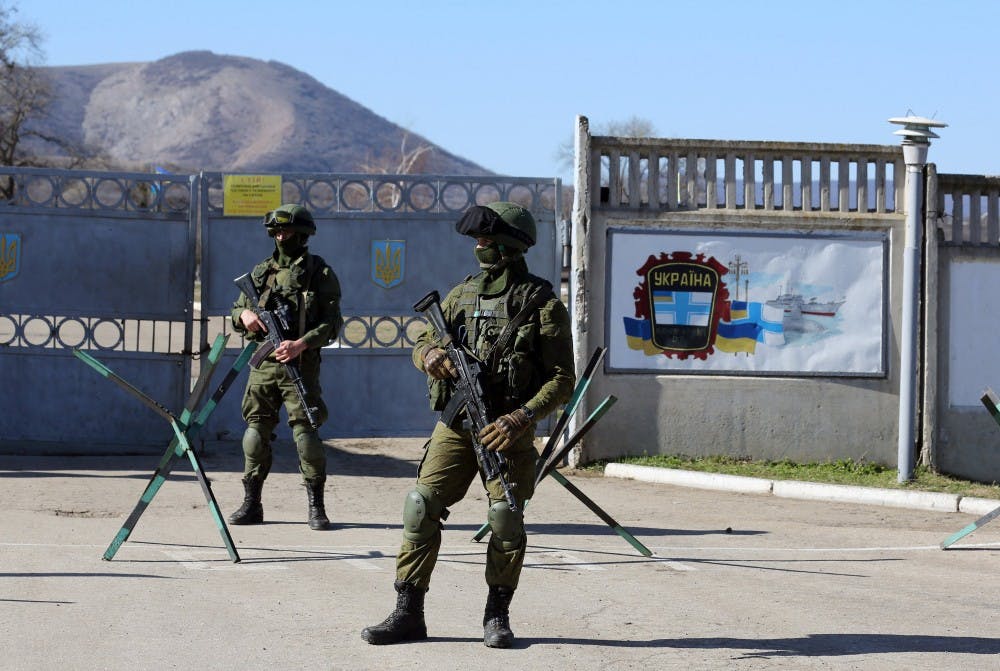Russia sets Ukraine agenda with diplomacy, threats
Russian troops said to be 16,000 strong tightened their stranglehold on Ukraine’s Crimean Peninsula on Monday, openly defying the U.S. and the European Union and rattling world capitals and stock markets.
The West struggled to find a way to get Russia to back down, but with little beyond already threatened diplomatic and economic sanctions, global markets fell sharply over the prospect of violent upheaval in the heart of Europe.
For its part, Moscow reiterated its price for ending the crisis: restoration of a deal reached with the opposition less than two weeks ago to form a national unity government in Kiev that represents pro-Russian as well as Ukrainian interests, with new elections to be hosted by December.
Ukraine, meanwhile, accused Russia of piracy for blocking two of the besieged country’s warships and ordering them to surrender or be seized.
Russia says Yanukovych requested troops
Ukraine’s fugitive President Viktor Yanukovych requested Russian soldiers in the strategic Crimea region “to establish legitimacy, peace, law and order,” Russia’s U.N. ambassador said Monday, contradicting the president’s own comments last week, while Ukraine’s ambassador said 16,000 troops are now deployed there.
The third emergency Security Council meeting in four days came amid fears that the Kremlin might carry out more land grabs in pro-Russian eastern Ukraine. Russia faced demands from almost all council members to pull out its troops and got no support for its military action from close ally China.
“With the exception of one member of the Security Council — the Russian Federation — we have heard overwhelming support for the territorial integrity of Ukraine and for peaceful dialogue,” U.S. Ambassador Samantha Power said.
Divided loyalties in Ukraine
Ukraine’s loyalties have been sharply divided between the Russian-speaking east and south, where people favor close ties with Moscow, and the west, where residents want to integrate more closely with the European Union.Ukraine’s armed forces reflect that divide. Units stationed in Russian-speaking regions are mostly manned by local residents who don’t necessarily support the new government in Kiev. That raises doubts about their loyalties in case of a military conflict with Russia.
The Ukrainian military’s reluctance to confront the Russians became obvious in Crimea, where a newly named Ukrainian navy chief went over to the pro-Russian local government, a day after his appointment. Regional officials said thousands of Ukrainian servicemen have done the same, but that claim can’t be independently confirmed.
Tense standoff in Crimea
Forces of Russia’s Black Sea Fleet based in Crimea and additional Russian troops sent to the peninsula have seized or blocked Ukrainian air bases, air defense missile batteries and other military facilities, and garrisons throughout the region. Ukraine’s military acknowledged that “practically all” of its military facilities in Crimea have been surrounded or taken over.
Russian forces overtook a ferry crossing linking Crimea with Russia, which would allow a quick military buildup in Crimea if Russia chooses to do so. Armed people also have sealed a narrow strip of land linking the peninsula with mainland Ukraine.
The Ukrainian military said Russia has recently brought four navy ships from other seas to the Crimean port of Sevastopol.
The Russians have demanded that Ukrainian soldiers in Crimea lay down their weapons. Some have agreed and left or joined pro-Russia forces. But others have refused and barricaded themselves at their bases.
EU halts Russia talks
European Union leaders called a special summit for Thursday, where they are expected to freeze visa liberalization and economic cooperation talks with Russia if Moscow hasn’t taken steps to calm the crisis in Ukraine’s Crimean peninsula.
EU foreign ministers said they also have stopped preparation for the G8 summit, which is set for June in the Russian resort of Sochi.
EU foreign policy chief Catherine Ashton said the EU would give Russia until the Thursday show clear signs of goodwill, including a willingness to open talks and a withdrawal of Russian troops to their barracks in the Crimea.





